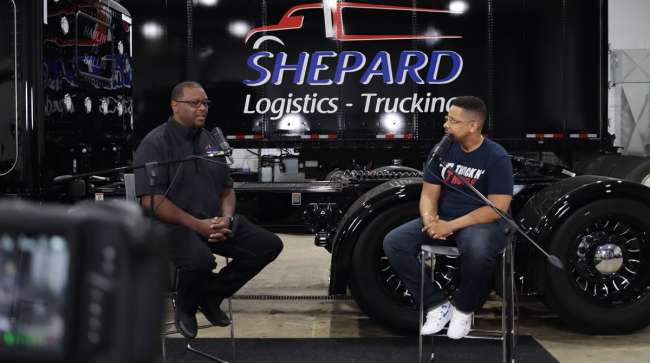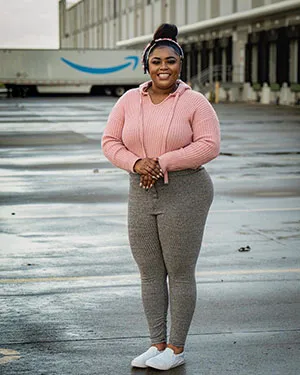Special to Transport Topics
Drivers Become Social Media Influencers

[Stay on top of transportation news: Get TTNews in your inbox.]
From encouraging women to enter the trucking industry to sharing a glimpse of her life on the road, Clarissa Rankin has leveraged the power of social media to promote the truck driving profession.
The upbeat driver is all about positivity and has accumulated 1.8 million followers on TikTok (@clarissarankin). She even caught the attention of Kelly Clarkson, who invited Rankin on her daytime talk show.
Rankin — who has been driving for six years and is now an owner-operator and a part-time instructor — uses her influencer status to promote positivity as well as to motivate and uplift others, especially women in trucking.
“I encourage people to do whatever they want to do in life, influencing you to believe in yourself and using words to trigger your motivation,” she said. “Influencers lead by example and provide you with that determination to be a better you.”
Female truck drivers like Rankin are establishing a niche in the influencer space, noted Ellen Voie, former president and CEO of the Women In Trucking Association (WIT).
“A female driver is still a pioneer,” she said. “To have them sharing a day in their life on TikTok is pretty cool and interesting to those who do not understand the trucking industry.”
Personal Branding
Social media has exploded over the past few years. So much so, that it is rare if one does not have some sort of social media presence. With an array of apps, it’s a powerful tool to broadcast any message to dedicated followers. But in order to harness that power, consistent communication is key.
Dre Fox, a social media coach, says a primary reason people turn to social media is for the entertainment value.

Social media coach Dre Fox. (LinkedIn)
“People are looking to be entertained and find something interesting about something that is often mundane,” Fox explained. “Rather than thinking you have to educate people, I would start to look at yourself as a personal brand or a public figure.”
She suggested that creators can produce content in the form of a series relative to being a trucker or owner such as meals you can cook in your truck, interviewing people you meet on the road or documenting the trucking life with your dog. She added that those who are most successful on these platforms are focusing on storytelling.
“I think it’s that idea of pulling back the curtain, revealing what it’s really like humanizing the experience and adding a unique perspective and twist to it to capture the hearts of the viewer,” Fox said. “There are so many creative ways to make what you do fun, exciting and unique. Ultimately, it comes down to you and your creativity and your ability to connect with other people on social media.”
In Fox’s view, TikTok and Instagram are the best options to reach the largest number of people, though Facebook is still relevant, often appealing to an older demographic.
Eventually, drivers who achieve influencer status may end up reaping financial rewards, such as brand partnerships or pays per view of their content, or becoming their own business, which is how Rahmel Wattley got started.
Wattley earned his CDL, but within a week, he knew that he did not want to be a truck driver. However, the transportation industry still beckoned, so after working in management and as a dispatcher for other companies, he launched a driver staffing and recruiting company in 2015. Four years later, after selling his company, Wattley created the podcast Truck N’ Hustle, which promotes the “Truck-preneur” culture and lifestyle. To date, he has hosted over 200 episodes.
In his podcast, Wattley explores such topics as “The Top Five Ways to Make Money in Trucking Without Owning a Truck,” “The Keys to Success in Heavy Haul Trucking,” and “Husband & Wife Build 7-Figure Trucking Company With 7K Start-Up.” He even attracted Daymond John of “Shark Tank” fame as a recent podcast guest.
“There are so many verticals and niches in the trucking industry,” said Wattley. “I noticed that people saw trucking as a one-sided thing. They only had one picture of it and didn’t realize how vast the whole supply chain was.”

Joel Morrow of Alpha Drivers Testing & Consulting traveled across America asking one simple question: What if a trucker designed a truck? Hear the program above and at RoadSigns.TTNews.com.
When he launched his podcast, his purpose was to teach listeners about different niches, including how to start a business, how to become a dispatcher, etc. His popularity grew, with 75,000 downloads of his podcast per month. He also has a large presence on other social media platforms.
“We leveraged the power of social media to empower people in the logistics space,” said Wattley. “Our mission is to promote literacy in transportation and logistics and build a bridge toward economic empowerment. We globally connect professionals, which we do through education and storytelling.”
Last year, he expanded to events and conferences, such as the first Freight Fest in November, attracting 700 attendees.
Wattley says he attracts such a broad audience because of the variety of topics he covers, but he does try to cater to the smaller carriers, as he felt there was a void in that niche. “I think every company should be creating some kind of content that is in your voice and that makes sense for you as a business owner and as a content creator,” he said.
Influencers uniformly agree that being authentic is what matters the most.
“The way you keep followers is to be true to who you are and just be consistent at being you,” said Rankin, who posts content on seven different platforms nearly daily with a short and simple message. Fox agrees, saying that the average post should be 15-30 seconds.
Community-Source Information
One bright spot in a depressing pandemic was that it caused many people to turn to social media for news. “It made us more comfortable with technology, and it created a spotlight for the trucking industry.” said Voie. Women in particular, such as those who have lost jobs in their service or nursing industries, have entered the trucking field during the pandemic as the trucking industry never shut down. Social media influencers contributed to that because of the way they have told their stories about the industry. Rankin concurred, adding that her ranking “blew up” during the pandemic.

Driver Clarissa Rankin shares her experiences with her 1.8 million followers on TikTok. (Clarissa Rankin)
Deb LaBree administers the WIT Facebook page and is on its image team. She feels that while social media can be used for privately earning money, another reason is to connect with other people, as the road can be a lonely place. “This is an industry where you’re gone from home, so we stay in touch with each other,” she said. “Having a social network of peers who are living the same lifestyle is comforting, as is having others to lean on.”
LaBree added that information-sharing is a key goal. In addition to utilizing it for camaraderie and celebrating members’ successes, users post important weather-related updates for trip planning.
“Our country is in a state of weather chaos; weather information is the No. 1 thing we need to know, such as which interstates are shut down, or if there are accidents; this is vital information,” said LaBree. She also shares content regarding the latest DOT rulings.
“There’s always learning in this industry, and things always change,” she said. “As long as people are influencing for the good, I’m all for it.”
Voie said that the association encourages image team members to use social media to talk about positive aspects of the trucking industry and to address misconceptions about women in trucking. “I believe our association has grown considerably because of our reach on social media,” added Voie.
Social media can also be used to inspire solutions to problems. For example, Voie said that one of their image team members posted photos of inadequate restrooms at shipping facilities, calling attention to something unacceptable with the goal of prompting the conditions to be fixed.
No matter how active someone is on social media, many influencers have found it to be a positive experience. Rankin said that TikTok has changed her life, and she enjoys sharing her accomplishments in the hope that it will inspire others.
“I’ll go on TikTok, and it is like going on a big stage,” she said. “I’ll get on and be me and show who I am and have a good time. My audience is my family now.”
Want more news? Listen to today's daily briefing below or go here for more info:


